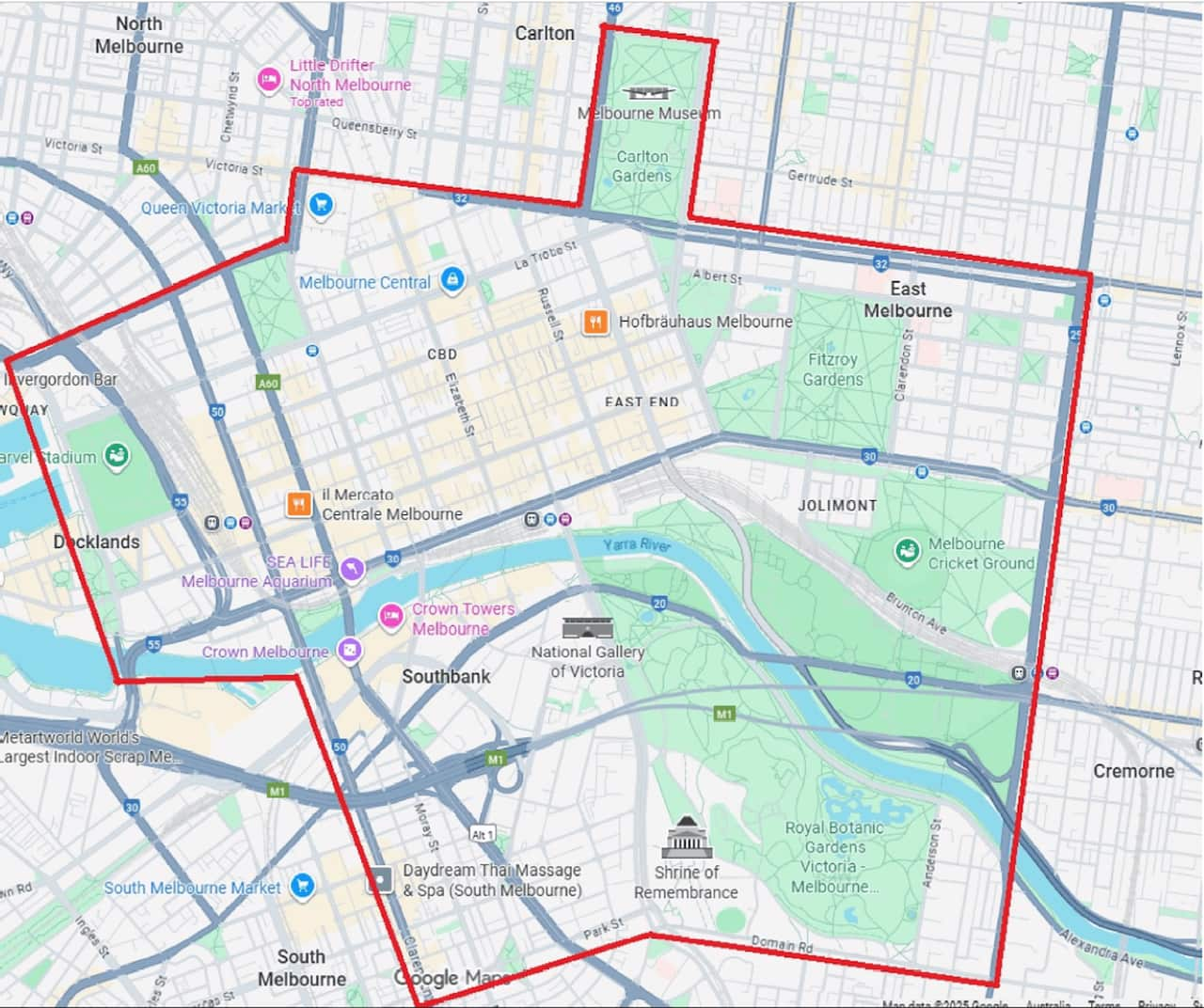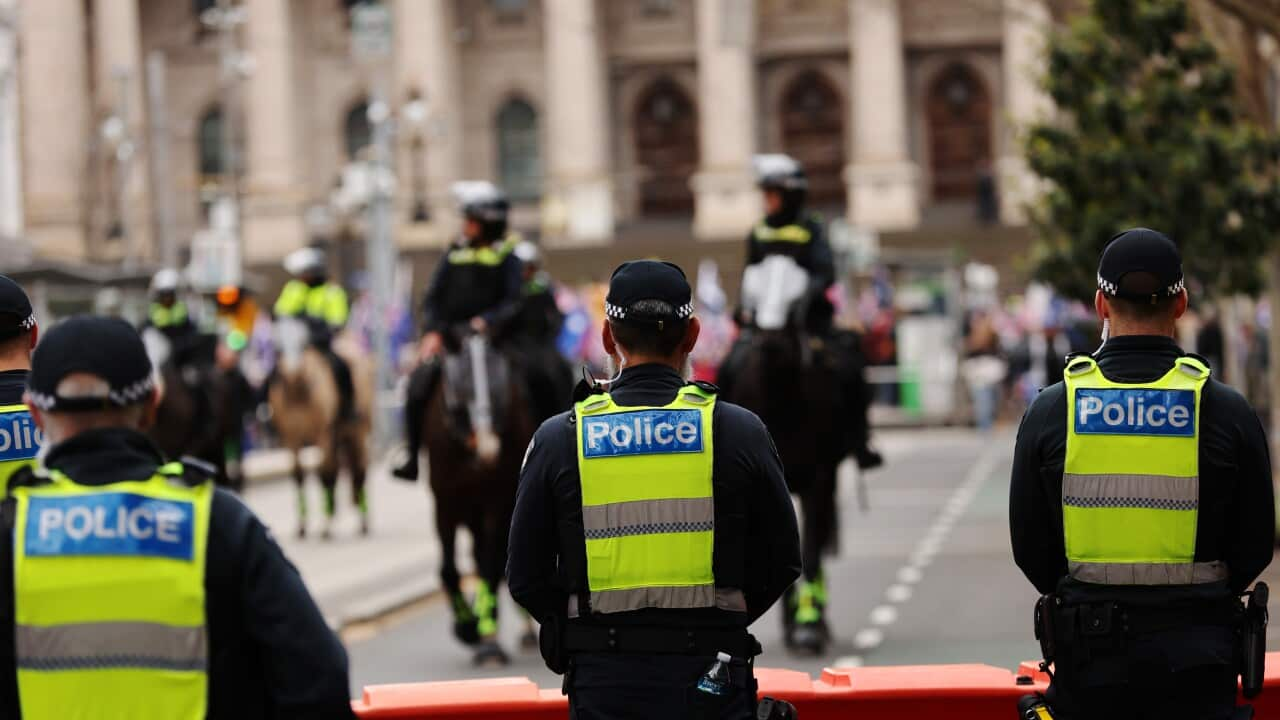For the next six months in Melbourne, police will have the power to stop and search people without warrants in what they say will be an invaluable tool for removing weapons from the streets.
But experts have questioned whether the rules are an overreach and raised concerns they could be used to target some groups.
From Sunday, police and protective service officers can exercise the powers within the Melbourne CBD, Docklands, Southbank, the sporting precinct, and parts of South Melbourne. The powers expire on 29 May 2026.
"These operations are an invaluable tool in assisting police with removing weapons from the streets, as knife crime in Victoria has risen," a spokesperson from Victoria police told SBS News.
Melbourne Lord Mayor Nicholas Reece said he welcomed the move and the council were supportive of introducing a "circuit breaker".
"This is very much welcomed by us. We have seen a 20 per cent increase in crime in the central city over the last 12 months. That is a fact," he told ABC Radio Melbourne.
RMIT assistant associate dean of social science research and policy Dr Kathryn Daley has told SBS it’s "almost entirely" a political move, as Victoria heads to the polls late next year.
"(Youth) crime has become a really politicised issue. The government wants to be seen as being up on that, and the police need to be seen as doing that," she said.
Earlier this month, Victorian Premier Jacinta Allan introduced 'adult time for violent crime' laws, where children as young as 14 could face possible life sentences under the proposed changes.
Then Opposition leader Brad Battin said at the time: "The premier is chasing another headline with no plan to follow through and deliver."

According to the Victorian Crime Statistics Agency, the number of criminal incidents recorded by Victoria Police in the year to 30 June 2025 was 483,583, compared to 408,930 the previous year, representing an increase of 18.3 per cent.
Property and deception offences are the largest category of crime in the state, making up 66 per cent. This includes theft, burglary and arson, and such crimes are four times more common than crimes against the person, such as assault.
In September, Victoria Police reported that 0.07 per cent of the population was responsible for 40 per cent of crime, stating recidivism in teenagers as a big factor.
The warrantless search powers encompass those aged under 18, and Daley said that young people are in public spaces, such as the CBD, more, because they have limited other places to socialise.
"They can't go into bars, they're under 18. Often in shopping centres, security staff move them on because young people hanging out is seen as a bad look," she said.
"Young people who congregate and will be congregating over summer holidays, will be targeted by police because people now see young people as potential gangs or criminals."
Daley said despite police saying that if you're not carrying a weapon, you don't have to worry, it's still humiliating to be searched.
"Imagine sitting in Federation Square, hanging with your friends, and the police come up and pat you down, ask to take your jacket off and search you. You might not have a weapon, but that is still a humiliating experience."
The powers are "unprecedented"
Daley told SBS News: "The reality is, people do feel unsafe and when people get scared, they want to feel a heightened police presence. But there’s no indication that these stop-and-search laws will actually make people safer."
"(The powers are) a vast overreach that doesn’t have an evidence base behind it, and there’s not even the suggestion that there’s any sort of logic or premise for the geographic breadth of it, but also the length of time.
"It’s a real sliding slope into people’s civil liberties and rights and freedoms to move across public spaces."
Inner Melbourne Community Legal (IMCL) has also warned the powers will infringe on civil liberties and the freedoms of people visiting the city.
IMCL chief executive Nadia Morales said the powers were "complete overkill".
The powers will allow officers to search a person or vehicle without a warrant, including asking someone to remove outer clothing or to take bags and items out of their pockets.
Police can also carry out searches using an electronic wand, or pat people down.
Morales said: "For a city that claims to be the world’s most liveable, it is a sad day indeed."
Will warrantless search powers target minorities?
A Victoria Police spokesperson said they have a zero tolerance towards racial profiling, echoing comments made earlier in the week following the release of a report alleging racial profiling was occurring.
"Our officers are well trained to police in response to a person’s behaviour, not their background."
However, Daley said: "In the past with stop and search laws, we’ve known that particular groups are overrepresented in who are targeted — racial minorities and young people especially."
Recent data, released on Monday by the Centre Against Racial Profiling (CARP), included all searches conducted by Victoria Police in 2024 that were recorded on its L19C forms – searches without a warrant.
Project researchers found Aboriginal people were 15 times more likely to be searched by Victoria Police officers than white people, while people perceived to be African were about nine times more likely.
People perceived as Middle Eastern and people perceived to be Pacific Islander were five times more likely to be searched than white people.
CARP founder Dr Tamar Hopkins said: "The data confirms that police are searching some racialised groups at far greater levels than white people."
SBS contacted Allan and Victoria Police for further comment but they had not responded by the time of publication.
For the latest from SBS News, download our app and subscribe to our newsletter.

